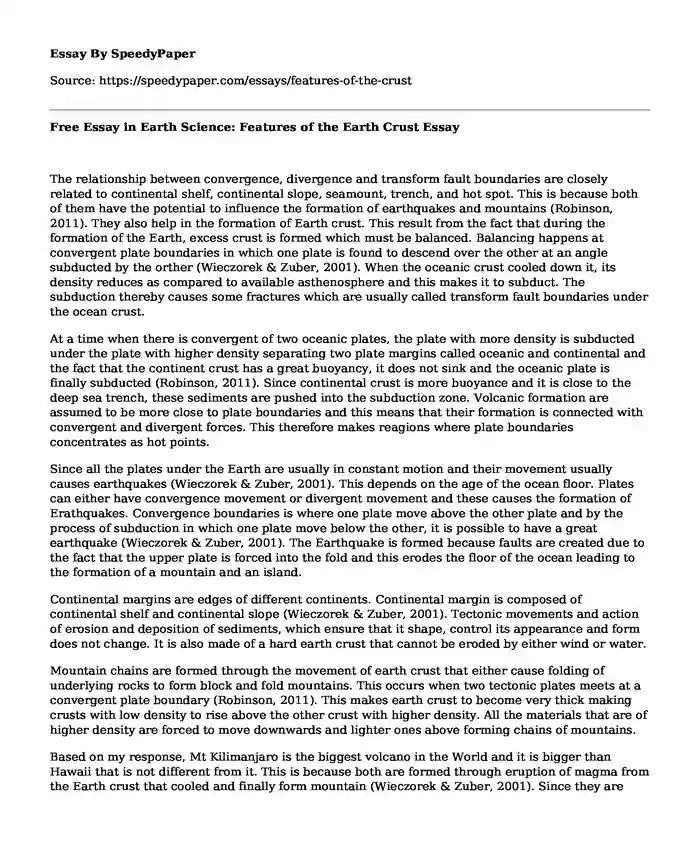The relationship between convergence, divergence and transform fault boundaries are closely related to continental shelf, continental slope, seamount, trench, and hot spot. This is because both of them have the potential to influence the formation of earthquakes and mountains (Robinson, 2011). They also help in the formation of Earth crust. This result from the fact that during the formation of the Earth, excess crust is formed which must be balanced. Balancing happens at convergent plate boundaries in which one plate is found to descend over the other at an angle subducted by the orther (Wieczorek & Zuber, 2001). When the oceanic crust cooled down it, its density reduces as compared to available asthenosphere and this makes it to subduct. The subduction thereby causes some fractures which are usually called transform fault boundaries under the ocean crust.
At a time when there is convergent of two oceanic plates, the plate with more density is subducted under the plate with higher density separating two plate margins called oceanic and continental and the fact that the continent crust has a great buoyancy, it does not sink and the oceanic plate is finally subducted (Robinson, 2011). Since continental crust is more buoyance and it is close to the deep sea trench, these sediments are pushed into the subduction zone. Volcanic formation are assumed to be more close to plate boundaries and this means that their formation is connected with convergent and divergent forces. This therefore makes reagions where plate boundaries concentrates as hot points.
Since all the plates under the Earth are usually in constant motion and their movement usually causes earthquakes (Wieczorek & Zuber, 2001). This depends on the age of the ocean floor. Plates can either have convergence movement or divergent movement and these causes the formation of Erathquakes. Convergence boundaries is where one plate move above the other plate and by the process of subduction in which one plate move below the other, it is possible to have a great earthquake (Wieczorek & Zuber, 2001). The Earthquake is formed because faults are created due to the fact that the upper plate is forced into the fold and this erodes the floor of the ocean leading to the formation of a mountain and an island.
Continental margins are edges of different continents. Continental margin is composed of continental shelf and continental slope (Wieczorek & Zuber, 2001). Tectonic movements and action of erosion and deposition of sediments, which ensure that it shape, control its appearance and form does not change. It is also made of a hard earth crust that cannot be eroded by either wind or water.
Mountain chains are formed through the movement of earth crust that either cause folding of underlying rocks to form block and fold mountains. This occurs when two tectonic plates meets at a convergent plate boundary (Robinson, 2011). This makes earth crust to become very thick making crusts with low density to rise above the other crust with higher density. All the materials that are of higher density are forced to move downwards and lighter ones above forming chains of mountains.
Based on my response, Mt Kilimanjaro is the biggest volcano in the World and it is bigger than Hawaii that is not different from it. This is because both are formed through eruption of magma from the Earth crust that cooled and finally form mountain (Wieczorek & Zuber, 2001). Since they are formed through the same process and have the same volcanic structures such as vent, it means that they are the same type of volcanic mountains.
References
Robinson, Eugene C. ( 2011). "The Interior of the Earth". U.S. Geological Survey. Retrieved August 30, 2013.
Wieczorek, M. A. & Zuber, M. T. (2001), "The composition and origin of the lunar crust: Constraints from central peaks and crustal thickness modeling", Geophysical Research Letters 28 (21): 40234026
Cite this page
Free Essay in Earth Science: Features of the Earth Crust. (2019, Oct 18). Retrieved from https://speedypaper.net/essays/features-of-the-crust
Request Removal
If you are the original author of this essay and no longer wish to have it published on the SpeedyPaper website, please click below to request its removal:
- Free Essay Example: Cloud Computing
- Free Essay with Hotel Industry Analysis
- Literary Essay Sample on Shooting an Elephant by George Orwell
- Nursing Essay Sample: Disregard for Informed Consent, Responsibility and Accountability, Ethical Practice
- Essay Example on Conceptualizations of Hegemony and Habitus
- Essay Sample on Reaping Returns from Community Investments
- Essay Sample on Military Myth: Iraq and Afghanistan Veterans
Popular categories





